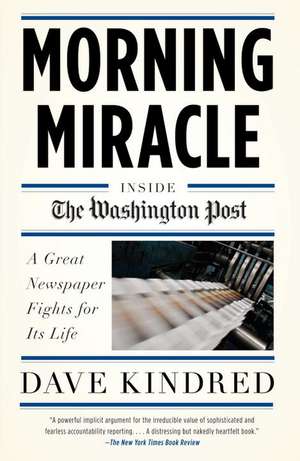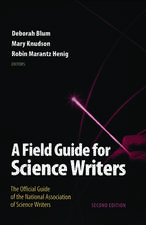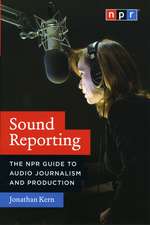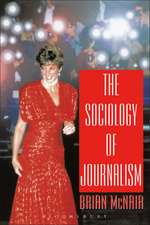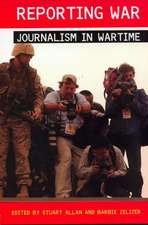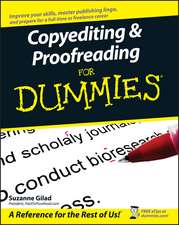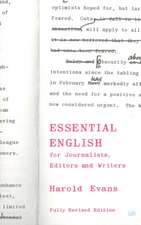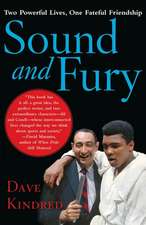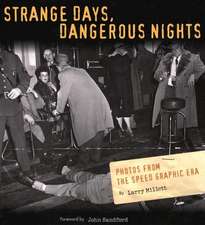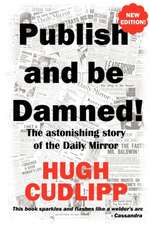Morning Miracle: A Great Newspaper Fights for Its Life
Autor Dave Kindreden Limba Engleză Paperback – 31 iul 2011
Morning Miracle takes readers inside the heart of a legendary paper in transition from newsprint to the digital realm, capturing the ambition, enthusiasm, and commitment to excellence that remains at the heart of world-class daily journalism. This fascinating look into the professionalism that drives one of our nation’s greatest papers demonstrates that though newsprint may vanish, great journalism will always matter.
Preț: 99.19 lei
Nou
Puncte Express: 149
Preț estimativ în valută:
18.98€ • 19.74$ • 15.67£
18.98€ • 19.74$ • 15.67£
Carte disponibilă
Livrare economică 24 martie-07 aprilie
Preluare comenzi: 021 569.72.76
Specificații
ISBN-13: 9780767928144
ISBN-10: 0767928148
Pagini: 266
Dimensiuni: 136 x 202 x 22 mm
Greutate: 0.29 kg
Editura: Anchor Books
ISBN-10: 0767928148
Pagini: 266
Dimensiuni: 136 x 202 x 22 mm
Greutate: 0.29 kg
Editura: Anchor Books
Notă biografică
Dave Kindred has reported and written for newspapers and magazines for forty-five years. He has been a Washington correspondent, sports columnist, and general-interest columnist. His work has won the Red Smith Award, sports journalism’s highest honor, as well as a National Headliner award for general-interest columns. Kindred’s stories have been anthologized in the Chicken Soup for the Soul series. He is the author of eight books, including, most recently, Sound and Fury, the dual biography of Muhammad Ali and Howard Cosell.
Extras
1.
BALLS AND GHOSTS
Eugene Meyer's first steps into newspaper history came on the staircase of his baronial country estate in Mount Kisco, in Westchester County, just north of New York City. Meyer was a titan of American business, wealthy beyond an ordinary man's dreams,and newly resigned from President Roosevelt's Federal Reserve Board. At age fifty-seven, he had become worn and weary; his wife, Agnes, saw him at "death's door." He had decided to retire and make way for the next generation, an idea that made sense in theabstract. In practice, however, it was hell. For a man accustomed to the frenzied swirl of political and financial action, a retiree's regret set in quickly. Two weeks of sleep, rest, and nothing to do had made Meyer bright-eyed, alert, and restless. As hedescended the curving staircase, running his fingers along the bannister, he felt dust.
He murmured to his wife, "This house is not properly run."
She answered, "Eugene, it's time you bought the Post."
The famous British publisher Alfred Charles Northcliffe had said, "Of all the American newspapers I would prefer to own The Washington Post, because it reaches the breakfast tables of the members of Congress." Agnes Meyer's order to her husband was bornof prior knowledge, for Meyer had tried to buy papers in Washington and was still eager to own the Post. "If he succeeds," Mrs. Meyer wrote in her diary, "it will be a sensation and we shall have a reputation for Machiavellian behavior"--they had told friendsthey were done with Washington. As for the inevitable expense, she wrote, "what after all is money for if not to be used . . . It is a great opportunity for E. to be a dominant influence in this formative period of the new America . . . a great chance to becreative."
On this day in May 1933, The Washington Post was not the powerful, proud journal of Lord Northcliffe's memory. It had fallen so far from grace that its very survival was in question.
The newspaper's owner was Edward Beale (Ned) McLean. He had inherited great wealth and married a woman even richer than himself. The fool's one original idea in a lifetime of profligacy seemed to have been the jury-rigging of a handkerchief sling to steadyhis drinking arm. His wife, Evalyn, the daughter of a prospector who found gold in the Rocky Mountains, spoke of Ned as "a queer, queer fellow" whose problems were "the natural consequences of unearned wealth in undisciplined hands." As a measure of her ownself-indulgence, she lived with the adulterous sot for twenty years.
They shared a mansion on I Street where Ned McLean kept a llama and a long-tailed monkey named Babe. "A mad place, truly," Evalyn wrote, "with a monkey in my bathroom, a llama on the lawn, and our corridors shrill with the curses of our parrot (learnedfrom a diplomat)." The monkey once "snatched from a table on the porch a tall glass of lemonade or something, and scampered up the side of the house by clutching vines and projections; and then everybody had forgotten about the little beast until it dribbledthe contents of the glass down on the striped flannels of President Harding."
No one knew if his life of dissipation had ruined Ned McLean's mind, or if his ruined mind led to the life of dissipation. He once swore under oath, in a lawsuit, that he did not urinate onto the leg of the Belgian ambassador, though undenied was the reportof a second stream directed into a White House fireplace. Inevitably, his newspaper's best use was as a covering for the bottom of his parrot's cage. The Post ran fifth in a five-paper town and some days printed no more than twelve pages of its thin gruel.It did not send a reporter to cover the Lindbergh baby kidnapping/murder drama. It had no one in Chicago for the Democratic convention that nominated FDR. Its star White House man, Ed Folliard, covered Herbert Hoover's renomination and then was fired to savemoney. The Post paid small notice to FDR's promise of a "new deal" and even less to Hitler's rise.
McLean's grandfather and father had built an empire on newspapers. Washington McLean was a Cincinnati boilermaker who got into politics in 1852 by making the Cincinnati Enquirer the loudest Democratic party voice west of the Alleghenies. His son, John,got rich a dozen ways before gaining control of the Post in 1905 and inviting Ned in. The family connections gained Ned favor with the Ohio politician Warren G. Harding, later one of Babe the monkey's targets.
Ned and Evalyn Walsh met as children in a dance class in Washington. Her father, Thomas Walsh, after discovering gold, left a wooden shack in the Colorado outback to build a palace on Massachusetts Avenue. It cost $835,000 and had sixty rooms, a four-storyreception hall, an elevator, and a Louis XIV ballroom. A biographer called Evalyn "a wild, gay child with an early developed taste for alcohol . . . Her small face with large houri eyes framed by dark hair . . . was wistfully pretty . . . Although undisciplined,uneducated, semi-literate, her mind--unlike Ned's--was sharp and alert, a quick if malformed intelligence."
When Evalyn and Ned married, they treated themselves to a European honeymoon on their fathers' wedding gift of $200,000. At Cartier's in Paris, Evalyn bought the Star of the East diamond for $120,000. On a later trip to Cartier's, with McLean co-signinga note, she committed $154,000 to buy the Hope Diamond, the blue stone of malevolent reputation that may or may not have belonged to Marie Antoinette, who in either case lost her head.
Shortly, McLean's cozy relationship with Harding ripened into scandal. He had been the president's poker buddy, golf partner, and traveling companion. One Christmas, when Harding had received death threats, Evalyn insisted that the president stay at herI Street house. There he chewed tobacco and played poker until two in the morning. Amused by the fuss, Harding said, "I am very grateful to my assassins for a very pleasant Christmas Day."
After Harding's sudden death in 1923, investigators discovered that officials in his administration had allowed private oil companies to tap into public reserves at the Teapot Dome field in Wyoming. The scandal snared Ned McLean. He had agreed to fakea loan for a friend under investigation who needed to explain $100,000 in his bank account. Then McLean lied about the deal. Finally, to avoid perjury charges, he told the truth to Congress. Two lines of eight-column type on the Post's front page read:
E.B. MCLEAN ANSWERS CLEARLY AND FRANKLY ALL QUESTIONS OF SENATE OIL INVESTIGATORS
Years later Post historian Chalmers Roberts called the headline "the most humiliating ever printed in a publisher's own paper." That year, 1924, the newspaper began its slide into insolvency, which led to the public auction held June 1, 1933, on the stepsof the Post's building at E Street and Pennsylvania Avenue. By that day, and for the rest of his days, Ned McLean was locked away in a private psychiatric hospital in suburban Washington.
Though there were only three bidders at the auction, the Post reported that "important personages of the worlds of finance and journalism mingled with the merely curious." Evalyn McLean, there to bid, wore the Hope Diamond. William Randolph Hearst, ownerof the Herald, sent his executive editor. A lawyer, George E. Hamilton Jr., represented a secret bidder--Eugene Meyer, who stayed in New York lest his presence drive up the bidding.
Twice before, Meyer had offered to buy Washington newspapers, first the Herald in 1925 and four years later the Post. But Hearst would not sell, and McLean turned down Meyer's offer of $5 million. Now, at the auction, Evalyn McLean dropped out at $600,000.Hearst's editor fell silent when Hamilton jumped every bid by as much as $50,000. The auction's climax was reported by the Herald:
A pleading note in his businesslike voice, the auctioneer exhorted: "Eight hundred thousand dollars bid. Do I hear 825? I have $800,000. Will you offer 25?"
From Hamilton, wedged in the center of the throng, near the auctioneer, came an offer of $825,000.
Bidding ended at this point, but not until [the lawyer Nelson T. Hartson] had again run back to see Mrs. McLean. Impatient at this further delay, Hamilton threatened to withdraw his bid unless the sale was promptly closed.
Three short words marked the passing of The Post into new hands: "Going, going, sold."
For less than 20 percent of what he had offered four years earlier, Eugene Meyer was back to work--this time as owner of The Washington Post.
Born in 1875, the first son of a French immigrant merchant who settled in Los Angeles, Meyer made himself a Wall Street financier and multimillionaire. Six presidents invited him into their administrations. He did sixteen years of public service work,from World War I into the Depression. One admiring journalist called Meyer "a remarkable combination of amiability, pugnacity, reliable judgment, and special audacity." All those elements were present one night at the National Press Club when Fleming Newbold,a vice president of the Post's afternoon rival, the Washington Star, complained of insomnia.
"I think I can help you," Meyer said.
"How?"
Meyer said, "Don't read your paper until you go to bed."
Across the next decade he spent millions raising the levels of the Post's talent and resources. Though far from the breakfast-table necessity of Lord Northcliffe's imagining, the paper did turn a profit in 1943. Soon, Meyer thought in terms of legacy.His daughter, Katharine, had worked briefly as a reporter. Her husband, Phil Graham, a lawyer who had imagined himself in the U.S. Senate, became the Post's publisher in 1946. Meyer and Phil Graham decided that to achieve and sustain dominance for generations,they had to end Washington's morning-newspaper war. Graham advocated buying the Times-Herald. On March 17, 1954, the deal was done at a cost of $8.5 million.
Meyer was seventy-eight years old and thinking even a generation past Phil and Katharine to their child, his grandson, Donald Edward Graham, then eight years old.
"The real significance of this event," the patriarch said, "is that it makes the paper safe for Donnie."
Katharine Meyer's life with Phil Graham began in the fall of 1939 when she hit him in the head with a window screen. She had been to dinner and a party with friends. Back at her house on S Street near Connecticut Avenue, she was calling good night froma second-floor window when she caused the screen to fall onto the people below, striking Graham. Their eyes first met when he "looked up to see me staring down with my mouth agape."
She was twenty-one, he was twenty-three. She was a child of the manor, pampered and privileged. He was raised on a houseboat in the Everglades, brilliant and ambitious; only years later could anyone imagine him as the haunted man of Edward Arlington Robinson'spoem "Richard Cory," a character who "fluttered pulses when he said, 'Good-morning' " and "one calm summer night, Went home and put a bullet in his head."
Katharine and Phil were born to exceptional families. Katharine's parents were the Meyers--Eugene, the self-made money man, and Agnes, a harpy when drinking and an intellectual who suffered no fools and inflicted upon her daughter harsh memories that shecarried forever. Ernest, Phil's father, was a rough-cut engineer up from nothing in South Dakota to a race for the Florida governor's job; his mother, Florence, was a schoolteacher who owned her son's heart and died of cancer when he was nineteen.
From Harvard Law School, where Phil had been elected president of the Law Review, he went to Washington to clerk first for Supreme Court Justice Stanley Reed, then for Justice Felix Frankfurter. On his third date with Katharine, he proposed and soon presentedhis plan for their life together. They would live in Florida, but she had to understand one thing: she would have only two dresses because he "would never take anything from my father or be involved with him and we would live on what he made." That determinationchanged after World War II. On discharge, U.S. Army Major Philip Graham went to work for his father-in-law.
Don Graham was born April 22, 1945. Fixing the future for the boy might have been the grandfather's ambition from the time he first saw him in the crib. Meyer wrote Phil a letter in which he said he had decided to call Donnie "Judge" because he was
calm and quiet, and seems to be balanced in a sort of judicial manner. I don't think anybody is going to get him excited if he can help it, and I think he thinks he can. If you think he is going to be a torchbearer for any of the "isms" that you want to hand himor try to instill in him, I feel it my duty to tell you I think you are going to be disappointed. On the other hand, if you have anything to say to him on a factual basis, with good evidence and perhaps a witness or two, I believe you may interest him in your presentation.
The "judge" was three years old when Katharine discovered him reading a primer that belonged to his sister, Lally, then five. At twelve he was a gambler making horse-race bets with a teacher, the stakes a candy bar. In golf games with his father, the betswere nickels, dimes, and quarters. Neighborhood boys came to the Grahams' R Street mansion to play, sometimes with the father. "All my friends just loved him, he was so damn funny," Don said years later. "He played these wildly competitive, funny, joking, teasing tennis games. He talked all the time, too, needling you, urging himself on, making jokes about himself nonstop."
Friends noticed, though, that there sometimes was an edge to Phil's chatter, especially when it was directed to Donnie. At bridge games, the boy seemed less his son to be praised than a rival to be beaten badly. Nicholas Friendly, a friend of Don's, wouldsay, "I don't think he made enormous efforts to build Don's confidence. And Phil was such a brilliant, brilliant man. Having to live up to that kind of brilliance was a pressure I wouldn't have wanted to have."
Donnie was precocious and lonely. As a high school athlete, he chose sports pursued alone: wrestling and tennis. He didn't drink, smoke, or show interest in girls. His idea of partying was a trip on Saturday night to the Howard Theater, two dollars forthe midnight show, to hear the jazz of Miles Davis, Herbie Mann, and John Coltrane, the Motown music of James Brown, Otis Redding, and Aretha Franklin, and the comic riffs of Moms Mabley and Redd Foxx. Every season he also attended a couple dozen Senators baseballgames.
He worked on the school newspaper, the St. Albans News. At home he met Washington's most prominent people, among them historian Arthur Schlesinger, columnists Joseph Alsop and Walter Lippmann, and the New York Times's James Reston. It was clear that Donniewas headed for the Post, as his grandfather had announced after the purchase of the other morning paper. Back then, though, all Donnie knew was how exciting it had been when his father came home by taxi in midafternoon to show him the Times-Herald comic stripsthat now belonged to the Post.
He was thirteen when Phil took him on a visit to the Senate majority leader, Lyndon Johnson. "My dad took me down with him one night to see Johnson and explained in advance what he was doing and why," Don said. "He wanted to get Johnson to show off forme about being Senate majority leader. Then he wanted to get Johnson to leak him a document for the Post for a story about some Texans in the oil and gas industry. They had thrown a fund-raising dinner for Joe Martin, the Republican leader in the House, afterthe House had voted down an oil and gas regulation bill. It happened just as my dad wanted. Johnson was organizing a new Senate committee on space in the aftermath of Sputnik. He put young Senator Scoop Jackson on speaker phone so I could listen to Jackson'sarguments about why he ought to be on this committee and hear Johnson masterfully answer the arguments. Then he explained he wouldn't put him on the space committee, but he was going to do him lots of other favors. I was a little political junkie at the time,and I was quite fascinated. In the end, Johnson gave my dad whatever document it was he wanted. And they wrote about it the next morning."
From the Hardcover edition.
BALLS AND GHOSTS
Eugene Meyer's first steps into newspaper history came on the staircase of his baronial country estate in Mount Kisco, in Westchester County, just north of New York City. Meyer was a titan of American business, wealthy beyond an ordinary man's dreams,and newly resigned from President Roosevelt's Federal Reserve Board. At age fifty-seven, he had become worn and weary; his wife, Agnes, saw him at "death's door." He had decided to retire and make way for the next generation, an idea that made sense in theabstract. In practice, however, it was hell. For a man accustomed to the frenzied swirl of political and financial action, a retiree's regret set in quickly. Two weeks of sleep, rest, and nothing to do had made Meyer bright-eyed, alert, and restless. As hedescended the curving staircase, running his fingers along the bannister, he felt dust.
He murmured to his wife, "This house is not properly run."
She answered, "Eugene, it's time you bought the Post."
The famous British publisher Alfred Charles Northcliffe had said, "Of all the American newspapers I would prefer to own The Washington Post, because it reaches the breakfast tables of the members of Congress." Agnes Meyer's order to her husband was bornof prior knowledge, for Meyer had tried to buy papers in Washington and was still eager to own the Post. "If he succeeds," Mrs. Meyer wrote in her diary, "it will be a sensation and we shall have a reputation for Machiavellian behavior"--they had told friendsthey were done with Washington. As for the inevitable expense, she wrote, "what after all is money for if not to be used . . . It is a great opportunity for E. to be a dominant influence in this formative period of the new America . . . a great chance to becreative."
On this day in May 1933, The Washington Post was not the powerful, proud journal of Lord Northcliffe's memory. It had fallen so far from grace that its very survival was in question.
The newspaper's owner was Edward Beale (Ned) McLean. He had inherited great wealth and married a woman even richer than himself. The fool's one original idea in a lifetime of profligacy seemed to have been the jury-rigging of a handkerchief sling to steadyhis drinking arm. His wife, Evalyn, the daughter of a prospector who found gold in the Rocky Mountains, spoke of Ned as "a queer, queer fellow" whose problems were "the natural consequences of unearned wealth in undisciplined hands." As a measure of her ownself-indulgence, she lived with the adulterous sot for twenty years.
They shared a mansion on I Street where Ned McLean kept a llama and a long-tailed monkey named Babe. "A mad place, truly," Evalyn wrote, "with a monkey in my bathroom, a llama on the lawn, and our corridors shrill with the curses of our parrot (learnedfrom a diplomat)." The monkey once "snatched from a table on the porch a tall glass of lemonade or something, and scampered up the side of the house by clutching vines and projections; and then everybody had forgotten about the little beast until it dribbledthe contents of the glass down on the striped flannels of President Harding."
No one knew if his life of dissipation had ruined Ned McLean's mind, or if his ruined mind led to the life of dissipation. He once swore under oath, in a lawsuit, that he did not urinate onto the leg of the Belgian ambassador, though undenied was the reportof a second stream directed into a White House fireplace. Inevitably, his newspaper's best use was as a covering for the bottom of his parrot's cage. The Post ran fifth in a five-paper town and some days printed no more than twelve pages of its thin gruel.It did not send a reporter to cover the Lindbergh baby kidnapping/murder drama. It had no one in Chicago for the Democratic convention that nominated FDR. Its star White House man, Ed Folliard, covered Herbert Hoover's renomination and then was fired to savemoney. The Post paid small notice to FDR's promise of a "new deal" and even less to Hitler's rise.
McLean's grandfather and father had built an empire on newspapers. Washington McLean was a Cincinnati boilermaker who got into politics in 1852 by making the Cincinnati Enquirer the loudest Democratic party voice west of the Alleghenies. His son, John,got rich a dozen ways before gaining control of the Post in 1905 and inviting Ned in. The family connections gained Ned favor with the Ohio politician Warren G. Harding, later one of Babe the monkey's targets.
Ned and Evalyn Walsh met as children in a dance class in Washington. Her father, Thomas Walsh, after discovering gold, left a wooden shack in the Colorado outback to build a palace on Massachusetts Avenue. It cost $835,000 and had sixty rooms, a four-storyreception hall, an elevator, and a Louis XIV ballroom. A biographer called Evalyn "a wild, gay child with an early developed taste for alcohol . . . Her small face with large houri eyes framed by dark hair . . . was wistfully pretty . . . Although undisciplined,uneducated, semi-literate, her mind--unlike Ned's--was sharp and alert, a quick if malformed intelligence."
When Evalyn and Ned married, they treated themselves to a European honeymoon on their fathers' wedding gift of $200,000. At Cartier's in Paris, Evalyn bought the Star of the East diamond for $120,000. On a later trip to Cartier's, with McLean co-signinga note, she committed $154,000 to buy the Hope Diamond, the blue stone of malevolent reputation that may or may not have belonged to Marie Antoinette, who in either case lost her head.
Shortly, McLean's cozy relationship with Harding ripened into scandal. He had been the president's poker buddy, golf partner, and traveling companion. One Christmas, when Harding had received death threats, Evalyn insisted that the president stay at herI Street house. There he chewed tobacco and played poker until two in the morning. Amused by the fuss, Harding said, "I am very grateful to my assassins for a very pleasant Christmas Day."
After Harding's sudden death in 1923, investigators discovered that officials in his administration had allowed private oil companies to tap into public reserves at the Teapot Dome field in Wyoming. The scandal snared Ned McLean. He had agreed to fakea loan for a friend under investigation who needed to explain $100,000 in his bank account. Then McLean lied about the deal. Finally, to avoid perjury charges, he told the truth to Congress. Two lines of eight-column type on the Post's front page read:
E.B. MCLEAN ANSWERS CLEARLY AND FRANKLY ALL QUESTIONS OF SENATE OIL INVESTIGATORS
Years later Post historian Chalmers Roberts called the headline "the most humiliating ever printed in a publisher's own paper." That year, 1924, the newspaper began its slide into insolvency, which led to the public auction held June 1, 1933, on the stepsof the Post's building at E Street and Pennsylvania Avenue. By that day, and for the rest of his days, Ned McLean was locked away in a private psychiatric hospital in suburban Washington.
Though there were only three bidders at the auction, the Post reported that "important personages of the worlds of finance and journalism mingled with the merely curious." Evalyn McLean, there to bid, wore the Hope Diamond. William Randolph Hearst, ownerof the Herald, sent his executive editor. A lawyer, George E. Hamilton Jr., represented a secret bidder--Eugene Meyer, who stayed in New York lest his presence drive up the bidding.
Twice before, Meyer had offered to buy Washington newspapers, first the Herald in 1925 and four years later the Post. But Hearst would not sell, and McLean turned down Meyer's offer of $5 million. Now, at the auction, Evalyn McLean dropped out at $600,000.Hearst's editor fell silent when Hamilton jumped every bid by as much as $50,000. The auction's climax was reported by the Herald:
A pleading note in his businesslike voice, the auctioneer exhorted: "Eight hundred thousand dollars bid. Do I hear 825? I have $800,000. Will you offer 25?"
From Hamilton, wedged in the center of the throng, near the auctioneer, came an offer of $825,000.
Bidding ended at this point, but not until [the lawyer Nelson T. Hartson] had again run back to see Mrs. McLean. Impatient at this further delay, Hamilton threatened to withdraw his bid unless the sale was promptly closed.
Three short words marked the passing of The Post into new hands: "Going, going, sold."
For less than 20 percent of what he had offered four years earlier, Eugene Meyer was back to work--this time as owner of The Washington Post.
Born in 1875, the first son of a French immigrant merchant who settled in Los Angeles, Meyer made himself a Wall Street financier and multimillionaire. Six presidents invited him into their administrations. He did sixteen years of public service work,from World War I into the Depression. One admiring journalist called Meyer "a remarkable combination of amiability, pugnacity, reliable judgment, and special audacity." All those elements were present one night at the National Press Club when Fleming Newbold,a vice president of the Post's afternoon rival, the Washington Star, complained of insomnia.
"I think I can help you," Meyer said.
"How?"
Meyer said, "Don't read your paper until you go to bed."
Across the next decade he spent millions raising the levels of the Post's talent and resources. Though far from the breakfast-table necessity of Lord Northcliffe's imagining, the paper did turn a profit in 1943. Soon, Meyer thought in terms of legacy.His daughter, Katharine, had worked briefly as a reporter. Her husband, Phil Graham, a lawyer who had imagined himself in the U.S. Senate, became the Post's publisher in 1946. Meyer and Phil Graham decided that to achieve and sustain dominance for generations,they had to end Washington's morning-newspaper war. Graham advocated buying the Times-Herald. On March 17, 1954, the deal was done at a cost of $8.5 million.
Meyer was seventy-eight years old and thinking even a generation past Phil and Katharine to their child, his grandson, Donald Edward Graham, then eight years old.
"The real significance of this event," the patriarch said, "is that it makes the paper safe for Donnie."
Katharine Meyer's life with Phil Graham began in the fall of 1939 when she hit him in the head with a window screen. She had been to dinner and a party with friends. Back at her house on S Street near Connecticut Avenue, she was calling good night froma second-floor window when she caused the screen to fall onto the people below, striking Graham. Their eyes first met when he "looked up to see me staring down with my mouth agape."
She was twenty-one, he was twenty-three. She was a child of the manor, pampered and privileged. He was raised on a houseboat in the Everglades, brilliant and ambitious; only years later could anyone imagine him as the haunted man of Edward Arlington Robinson'spoem "Richard Cory," a character who "fluttered pulses when he said, 'Good-morning' " and "one calm summer night, Went home and put a bullet in his head."
Katharine and Phil were born to exceptional families. Katharine's parents were the Meyers--Eugene, the self-made money man, and Agnes, a harpy when drinking and an intellectual who suffered no fools and inflicted upon her daughter harsh memories that shecarried forever. Ernest, Phil's father, was a rough-cut engineer up from nothing in South Dakota to a race for the Florida governor's job; his mother, Florence, was a schoolteacher who owned her son's heart and died of cancer when he was nineteen.
From Harvard Law School, where Phil had been elected president of the Law Review, he went to Washington to clerk first for Supreme Court Justice Stanley Reed, then for Justice Felix Frankfurter. On his third date with Katharine, he proposed and soon presentedhis plan for their life together. They would live in Florida, but she had to understand one thing: she would have only two dresses because he "would never take anything from my father or be involved with him and we would live on what he made." That determinationchanged after World War II. On discharge, U.S. Army Major Philip Graham went to work for his father-in-law.
Don Graham was born April 22, 1945. Fixing the future for the boy might have been the grandfather's ambition from the time he first saw him in the crib. Meyer wrote Phil a letter in which he said he had decided to call Donnie "Judge" because he was
calm and quiet, and seems to be balanced in a sort of judicial manner. I don't think anybody is going to get him excited if he can help it, and I think he thinks he can. If you think he is going to be a torchbearer for any of the "isms" that you want to hand himor try to instill in him, I feel it my duty to tell you I think you are going to be disappointed. On the other hand, if you have anything to say to him on a factual basis, with good evidence and perhaps a witness or two, I believe you may interest him in your presentation.
The "judge" was three years old when Katharine discovered him reading a primer that belonged to his sister, Lally, then five. At twelve he was a gambler making horse-race bets with a teacher, the stakes a candy bar. In golf games with his father, the betswere nickels, dimes, and quarters. Neighborhood boys came to the Grahams' R Street mansion to play, sometimes with the father. "All my friends just loved him, he was so damn funny," Don said years later. "He played these wildly competitive, funny, joking, teasing tennis games. He talked all the time, too, needling you, urging himself on, making jokes about himself nonstop."
Friends noticed, though, that there sometimes was an edge to Phil's chatter, especially when it was directed to Donnie. At bridge games, the boy seemed less his son to be praised than a rival to be beaten badly. Nicholas Friendly, a friend of Don's, wouldsay, "I don't think he made enormous efforts to build Don's confidence. And Phil was such a brilliant, brilliant man. Having to live up to that kind of brilliance was a pressure I wouldn't have wanted to have."
Donnie was precocious and lonely. As a high school athlete, he chose sports pursued alone: wrestling and tennis. He didn't drink, smoke, or show interest in girls. His idea of partying was a trip on Saturday night to the Howard Theater, two dollars forthe midnight show, to hear the jazz of Miles Davis, Herbie Mann, and John Coltrane, the Motown music of James Brown, Otis Redding, and Aretha Franklin, and the comic riffs of Moms Mabley and Redd Foxx. Every season he also attended a couple dozen Senators baseballgames.
He worked on the school newspaper, the St. Albans News. At home he met Washington's most prominent people, among them historian Arthur Schlesinger, columnists Joseph Alsop and Walter Lippmann, and the New York Times's James Reston. It was clear that Donniewas headed for the Post, as his grandfather had announced after the purchase of the other morning paper. Back then, though, all Donnie knew was how exciting it had been when his father came home by taxi in midafternoon to show him the Times-Herald comic stripsthat now belonged to the Post.
He was thirteen when Phil took him on a visit to the Senate majority leader, Lyndon Johnson. "My dad took me down with him one night to see Johnson and explained in advance what he was doing and why," Don said. "He wanted to get Johnson to show off forme about being Senate majority leader. Then he wanted to get Johnson to leak him a document for the Post for a story about some Texans in the oil and gas industry. They had thrown a fund-raising dinner for Joe Martin, the Republican leader in the House, afterthe House had voted down an oil and gas regulation bill. It happened just as my dad wanted. Johnson was organizing a new Senate committee on space in the aftermath of Sputnik. He put young Senator Scoop Jackson on speaker phone so I could listen to Jackson'sarguments about why he ought to be on this committee and hear Johnson masterfully answer the arguments. Then he explained he wouldn't put him on the space committee, but he was going to do him lots of other favors. I was a little political junkie at the time,and I was quite fascinated. In the end, Johnson gave my dad whatever document it was he wanted. And they wrote about it the next morning."
From the Hardcover edition.
Recenzii
“A powerful implicit argument for the irreducible value of sophisticated and fearless accountability reporting. . . . A distressing but nakedly heartfelt book. . . . Morning Miracle may be the best semi-insider’s account we’ll get about a newspaper’s losing season of red ink, cutbacks and institutional angst amid the current industry crisis. . . . Kindred is a connoisseur of journalists’ voices. . . . [He writes with] a sportswriter’s unfailing good humor and sympathy for his chorus of ink-stained wretches.”
—The New York Times Book Review
“A love story, a tale of passion starring a faded beauty trying desperately to hang on in a rapidly changing world. . . . Kindred paints a vivid picture of the paper, its people, its triumphs and its struggle to survive in a media landscape transformed profoundly and inexorably by the Internet.”
—The Washington Post
“Revelatory and entertaining. . . . A poignant and indelible reminder about the importance of the First Amendment.”
—The Philadelphia Inquirer
“Morning Miracle will appeal to news junkies everywhere, but it wouldn’t be a bad idea for anyone concerned about thorough and accurate coverage of the news hereafter to have a look.”
—Providence Journal
“An intimate look at one of America’s most prestigious and powerful newspapers. . . . A heartfelt—and often-heartbreaking—tale of the challenges faced not only by The Post but by every other American newspaper. . . . Miracle is both a tribute to journalists and journalism and a case study of the ramifications of the corporate downsizing of newspapers. It also captures the odd yet committed nature of journalists.”
—The Columbus Dispatch
“Addictive. . . . Like all good reporters, Kindred tells this informative and entertaining story through people—the Post’s stars and drudges, its curmudgeons and eccentrics—to elucidate its triumphs and failures.”
—Richmond Times-Dispatch
“A rich portrait. . . . With a romantic’s love of the reporting life, unique access to the inner chambers of the Post and a gift for hand-tooled writing, Kindred tells how, as the subtitle implies, a great newspaper fights for its life. The result is a book as engaging as any contemporary novel and as telling as any history about America today.”
—The Roanoke Times (Virginia)
“Kindred epitomizes the classic sports columnist: dogged, eloquent, skeptical yet enthusiastic, dedicated more to his craft than his ‘brand.’ His 8-page introduction alone is worth the cost of the book. . . . For anyone interested in how newspapers work, [Morning Miracle] is a must-read.”
—The Courier-Journal (Louisville, Kentucky)
“Morning Miracle is both a love letter to newspapers and an elegy for days long gone. . . . [Kindred] nails what's wrong with newspapers in general, and with the Post in particular.”
—AARP Magazine
“Busy and exciting and fun to read. . . . Kindred has a real gift for describing his fellow Posties. . . . [And] is equally adept at describing action in the newsrooms. . . . His book successfully takes the reader inside a great newspaper as it tries to endure.”
—Columbia Journalism Review
“There’s always some guy in the newsroom who knows the real story.”
—Roger Ebert
“Kindred’s book is the miracle, making this old New York Times man wish he had spent at least one shining moment in the heartbreaking romance of The Washington Post.”
—Robert Lipsyte
“This is a book about reporting and reporters. The best reporter involved in it is the one writing it. Through his talent, his wit, and his uncommon humanity, Kindred demonstrates a love for journalism as a job, as a craft, and, above all, as a calling. In fact, he loves it more than it probably deserves to be loved anymore.”
—Charles P. Pierce
—The New York Times Book Review
“A love story, a tale of passion starring a faded beauty trying desperately to hang on in a rapidly changing world. . . . Kindred paints a vivid picture of the paper, its people, its triumphs and its struggle to survive in a media landscape transformed profoundly and inexorably by the Internet.”
—The Washington Post
“Revelatory and entertaining. . . . A poignant and indelible reminder about the importance of the First Amendment.”
—The Philadelphia Inquirer
“Morning Miracle will appeal to news junkies everywhere, but it wouldn’t be a bad idea for anyone concerned about thorough and accurate coverage of the news hereafter to have a look.”
—Providence Journal
“An intimate look at one of America’s most prestigious and powerful newspapers. . . . A heartfelt—and often-heartbreaking—tale of the challenges faced not only by The Post but by every other American newspaper. . . . Miracle is both a tribute to journalists and journalism and a case study of the ramifications of the corporate downsizing of newspapers. It also captures the odd yet committed nature of journalists.”
—The Columbus Dispatch
“Addictive. . . . Like all good reporters, Kindred tells this informative and entertaining story through people—the Post’s stars and drudges, its curmudgeons and eccentrics—to elucidate its triumphs and failures.”
—Richmond Times-Dispatch
“A rich portrait. . . . With a romantic’s love of the reporting life, unique access to the inner chambers of the Post and a gift for hand-tooled writing, Kindred tells how, as the subtitle implies, a great newspaper fights for its life. The result is a book as engaging as any contemporary novel and as telling as any history about America today.”
—The Roanoke Times (Virginia)
“Kindred epitomizes the classic sports columnist: dogged, eloquent, skeptical yet enthusiastic, dedicated more to his craft than his ‘brand.’ His 8-page introduction alone is worth the cost of the book. . . . For anyone interested in how newspapers work, [Morning Miracle] is a must-read.”
—The Courier-Journal (Louisville, Kentucky)
“Morning Miracle is both a love letter to newspapers and an elegy for days long gone. . . . [Kindred] nails what's wrong with newspapers in general, and with the Post in particular.”
—AARP Magazine
“Busy and exciting and fun to read. . . . Kindred has a real gift for describing his fellow Posties. . . . [And] is equally adept at describing action in the newsrooms. . . . His book successfully takes the reader inside a great newspaper as it tries to endure.”
—Columbia Journalism Review
“There’s always some guy in the newsroom who knows the real story.”
—Roger Ebert
“Kindred’s book is the miracle, making this old New York Times man wish he had spent at least one shining moment in the heartbreaking romance of The Washington Post.”
—Robert Lipsyte
“This is a book about reporting and reporters. The best reporter involved in it is the one writing it. Through his talent, his wit, and his uncommon humanity, Kindred demonstrates a love for journalism as a job, as a craft, and, above all, as a calling. In fact, he loves it more than it probably deserves to be loved anymore.”
—Charles P. Pierce
Descriere
Forty-year veteran reporter Kindred takes readers inside the heart of the legendary newspaper, and offers a unique opportunity to see what it really takes to produce world-class journalism every day.
